Table of Contents:
Irene Käosaar: Flexibility and a fresh outlook are the keywords for 2021 – a year of hope
Registration for free Estonian language courses opens on 20 January
Let one of our advisers help you on your language-learning journey
Language Roulette: Estonian language environment at your home
Language Friends to help learners once again
Language clubs are open to new members
Language learners practise their Estonian and Russian by singing in a mixed choir
Experience sharing meetings help returnees to adapt more quickly to Estonian life
Integration Foundation awarded Volunteer’s Friend Label
Open calls for tenders and calls for proposals
Irene Käosaar: Flexibility and a fresh outlook are the keywords for 2021 – a year of hope
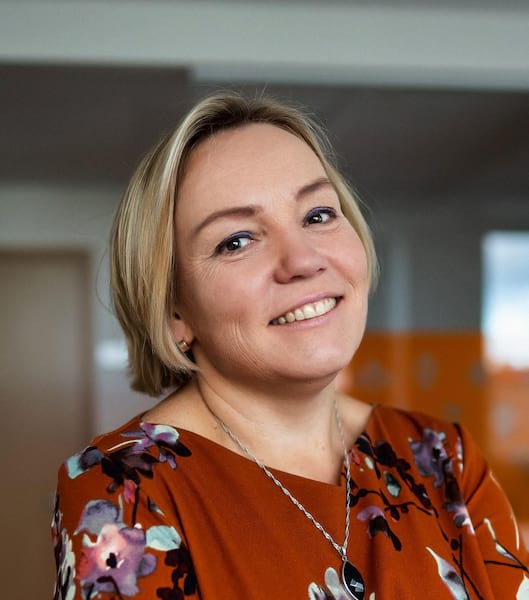 The Integration Foundation gained a proverbial new lease on life in 2018 when it was tasked with establishing Estonian Language Centres in Tallinn and Narva by the government. Two years of hard work in building up these centres – physically and in terms of staff and services – have now started to pay off. Both centres opened their doors in 2019, with classes launched shortly afterwards. Everyone and everything soon settled into place, and things were going very smoothly...
The Integration Foundation gained a proverbial new lease on life in 2018 when it was tasked with establishing Estonian Language Centres in Tallinn and Narva by the government. Two years of hard work in building up these centres – physically and in terms of staff and services – have now started to pay off. Both centres opened their doors in 2019, with classes launched shortly afterwards. Everyone and everything soon settled into place, and things were going very smoothly...
...until last spring, during which we were planning to launch a raft of new activities for our students and recruit and train extra teachers. Whereas previously we’d been all about bringing people together in one place, now we had to take a different tack, which we promptly did: within just a few weeks we’d transferred all of our main activities (which is to say Estonian lessons and consultation) online, supported by our partners in making the transition to digital learning.
We’re happy we were able to adapt to the situation without having to abandon almost any of our activities – we launched application rounds as planned, we supported a range of organisations and projects in the field of integration, we continued to give Estonian lessons (offering them online for the first time), we provided our consultation services via e-channels, we found new web-based ways for students to practise their Estonian and we recruited a remarkable number of volunteers to help them hone their skills.
Because of the ongoing situation in Estonia and around the world, we’re continuing to adapt and to tailor our activities and services, since as things stand none of us knows when or indeed if we’ll ever be able to ‘go back to normal’. We’re starting the year, as we’ve done many times before, by opening registration for our free Estonian courses – where the majority of the learning this time will take place online. We’ll be offering students the support of our volunteer mentors, with whom they’ll get the chance to practise their Estonian as part of the Language Friends and Language Roulette programmes. We’ll also be continuing to offer opportunities for language practice that have proven popular, plus we’ll be introducing new ones, both virtually and (once circumstances allow) face to face. Throughout the year we’ll be taking a flexible approach to supporting projects aimed at boosting integration, fostering contact between people and promoting Estonian and national minority culture.
The integration monitoring report which is due to be published this year will offer a fresh outlook on the impact of the work done by organisations contributing to the field of integration and show the way in the planning of further developments. To broaden our outlook further, we’ll be focussing more on getting feedback from our language learners, service users and partners and, as a result, on our development as an organisation. We’ll also be conducting an impact analysis this year on the activities of our Estonian Language Centres, as well as satisfaction surveys among our staff and partners – because it’s very important to us that we do the right things and that we do them well and with proper consideration for others.
‘Quality in everything we do’ is the objective we’re aiming to achieve, this year as in any other. Our teachers will be offering language learners studies that are based on the latest methods, in regard to which we’re providing our teachers with regular in-service training. To ensure even higher quality in consultation, we’ll be tweaking our client and consultation management system, and we’ll be working to improve the solution we use to allow people to register for web-based courses. For the transparent and objective evaluation of the applications and offers submitted in application rounds and procurements, we’ll be bringing on board assessment committees put together as a result of a competition. And last but not least, we’ll also be developing our info channels so that all of our target groups have better access to the information they need.
We’re constantly evolving. Every day we learn from what we do and from our partners and students, and we’re flexible in taking events in society and around the world into consideration.
Irene Käosaar, Integration Foundation director
Registration for free Estonian language courses opens on 20 January
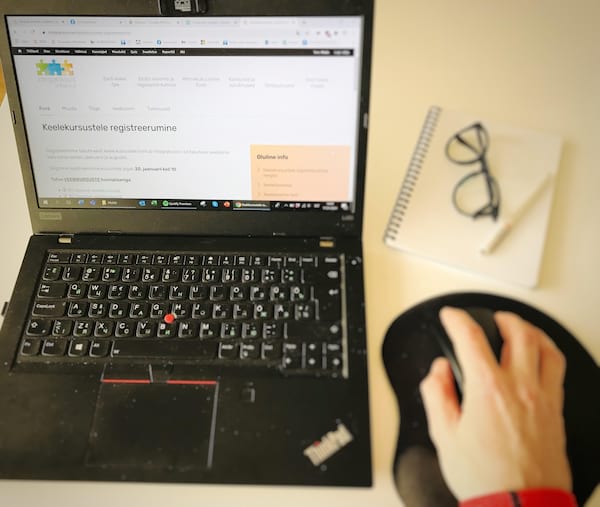 Public registration for free Estonian language courses will open on the website of the Integration Foundation at 10:00 on Wednesday 20 January. Registration is open to adults from the age of 18 using their ID card, Mobile ID or Smart ID. A total of 1344 people will be commencing or continuing their free studies of Estonian in January and February.
Public registration for free Estonian language courses will open on the website of the Integration Foundation at 10:00 on Wednesday 20 January. Registration is open to adults from the age of 18 using their ID card, Mobile ID or Smart ID. A total of 1344 people will be commencing or continuing their free studies of Estonian in January and February.
The Integration Foundation is offering 285 places in online courses at the B1, B2 and C1 levels and 375 places in face-to-face classes at the A1-C1 levels, meaning that 660 people in total will be able to study by registering. Also studying the national language will be a further 684 people who were either recommended for a course during their consultation with the Integration Foundation in 2020 or who will be continuing their studies having successfully completed the previous level. Overall, this means that 1344 people will be commencing or continuing their free studies of Estonian in January and February.
“There are two ways of taking up studies of Estonian on the free courses offered by the Integration Foundation,” explained Head of Language Studies Jana Tondi. “One is by registering online, which you can do twice a year, and the other way is by coming in for a free consultation at one of our offices. During one of these consultations we look at your learning background and your language needs and offer options to get you on one of the courses offered by our Estonian Language Centres or one of our partners as quickly as possible. Anyone who’s unable to or misses out on registering online should contact our advisers and find out what other opportunities there are for them to take up Estonian studies.”
Registration is open using your ID card, Mobile ID or Smart ID. Those registering with their ID card should bear in mind that they will need a card reader and must be able to recall their PIN-1. They will also need to check that their card certificate is still valid and that ID software has been installed on their computer.
Course timetables are available on the Integration Foundation’s website. The registration rules can likewise be found on the site, on which you can also take a placement test.
To register for a consultation, contact our advisers by e-mailing info@integratsiooniinfo.ee or calling the free hotline 800 9999.
The next registration round for the Integration Foundation’s free Estonian language courses will take place in August 2021.
Estonian language studies on courses run by the Integration Foundation are financed by the Ministry of Culture.
Let one of our advisers help you on your language-learning journey
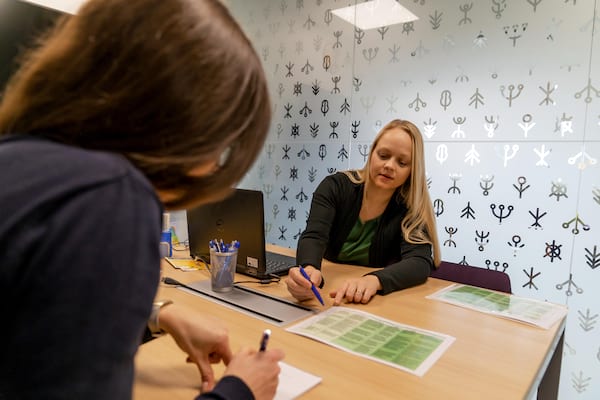 The Integration Foundation offers advisory services to adults who wish to learn Estonian, helping them choose the options that are best suited to them.
The Integration Foundation offers advisory services to adults who wish to learn Estonian, helping them choose the options that are best suited to them.
Such consultations are primarily geared towards those who are:
- looking to start or continue studying Estonia but who need advice on the formats and options that are available and most likely to suit them;
- hoping to enrol on a free Estonian language courses that take place 2-3 times per year; or
- looking to study Estonian independently and need information on what options are available to them.
The advisers at the Integration Foundation’s Estonian Language Centres help to analyse each person’s needs and experience, determine their current language level and draw up a suitable study programme. As a result of such a consultation, the person has the chance to join one of the free Estonian courses offered by the foundation if it is felt that this is the learning format best suited to them. In this case, the person does not have to register for the course as part of the public online registration round.
Our advisers can also be contacted over the phone or on Skype.
In addition, our advisers can provide information and guidance on other issues related to integration and adaptation, including relevant services and support.
To register for a consultation, contact our advisers by e-mailing info@integratsiooniinfo.ee or calling the free hotline 800 9999.
Answers to general questions about language-learning opportunities and basic information about living in Estonia can also be found on our councelling web.
Our advisory services are financed via the European Social Fund project ‘Terms and conditions of the provision of support for activities promoting integration in Estonian society’.
Language Roulette: Estonian language environment at your home
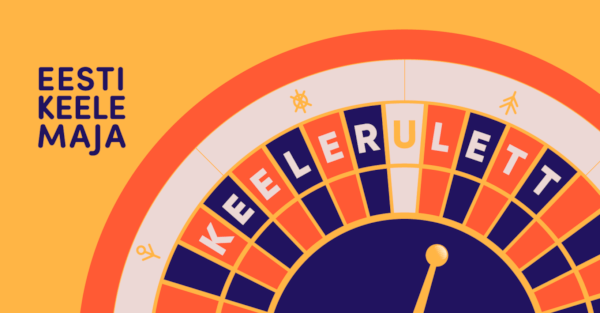 Language Roulette is a series of virtual meetings coorganized by teachers and mentors of the Estonian language houses of the Integration Foundation, which brings together people who want to practice Estonian in a new format of short conversations in the Zoom environment.
Language Roulette is a series of virtual meetings coorganized by teachers and mentors of the Estonian language houses of the Integration Foundation, which brings together people who want to practice Estonian in a new format of short conversations in the Zoom environment.
Participants of the Language Roulette can chat for a limited time in Estonian on a given topic in a random group. After that, the group will be changed and a new conversation on the new topic will begin. Both language learners and mentors who speak Estonian at the level of native speaker will participate in the conversations.
All conversations will be taking place in the Zoom environment. During the first half of this year, everyone can participate in the Language Roulette on January 26, February 9, February 23, March 9, March 23, April 6, April 20, May 4 and May 18 at 6 p.m.
Registration information will be rountinely added to the Estonian language house Facebook page and the Calendar of Events of the Integration Foundation.
We will send the Zoom meeting address to the participants after registration.
Language Friends to help learners once again
 February will see language lovers being assisted once more as part of the Language Friends programme of the Integration Foundation, with mentors volunteering to help learners practise their spoken Estonian by regularly chatting to them on a wide range of topics via e-channels.
February will see language lovers being assisted once more as part of the Language Friends programme of the Integration Foundation, with mentors volunteering to help learners practise their spoken Estonian by regularly chatting to them on a wide range of topics via e-channels.
Last spring saw the launch of Stage 1 of the Language Friends programme, which ran until mid-May, bringing 885 people together with the aim of learning and practising Estonian. A total of 410 volunteer mentors, responding to a call on social media, helped 475 learners of the national language hone their communication skills by engaging them in virtual conversations. The programme helped a lot of learners improve their Estonian and emboldened them to use the language.
“Since the results of the first stage were even better than we’d anticipated, we’re continuing to bring language friends together this year,” explained Ave Landrat, the Coordinator of Cooperation Activities at the Integration Foundation’s Estonian Language Centre in Tallinn. “A lot of the mentors and learners stayed in touch through summer and autumn and are still chatting now, but quite a few others have put up their hands and said they’re interested in joining the programme as well. That’s why we called on our mentors at the end of last year to see whether they were still willing and able to help learners practise their Estonian. So far, 130 have volunteered again, and we’ll be offering their help to language learners in February.”
The Integration Foundation will be providing information on opportunities to take part in the Language Friends programme on its website and Facebook page.
Language clubs are open to new members
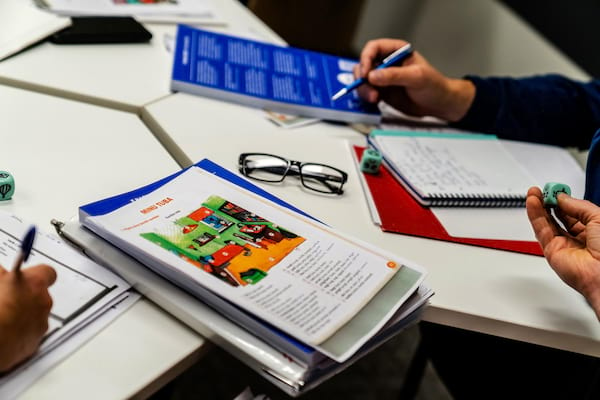 Estonian language and culture clubs represent an additional opportunity for those interested in learning the national language to hone their skills and practise the spoken language. The list of the clubs that are set to open is being constantly updated, with registration on the Integration Foundation website.
Estonian language and culture clubs represent an additional opportunity for those interested in learning the national language to hone their skills and practise the spoken language. The list of the clubs that are set to open is being constantly updated, with registration on the Integration Foundation website.
The clubs are designed primarily for those who already speak Estonian at the Intermediate or a more advanced level but who need more practice and encouragement in order to communicate in the language more freely. They are ideal for those who want to practise their Estonian so as to better speak it at the B2 or C1 levels or to prepare for the spoken part of the B2 or C1 exams.
The clubs are open to anyone aged 18 and over who has passed the state exam in Estonian at the B2 or C1 level or at the Intermediate or Advanced level (see §39 of the Language Act) and has a certificate to prove it.
The Integration Foundation organises language and culture clubs as part of the European Social Fund project ‘Terms and conditions of the provision of support for activities promoting integration in Estonian society’.
Language learners practise their Estonian and Russian by singing in a mixed choir
 A mixed choir brought together by the Integration Foundation’s Estonian Language Centre in Narva is giving 45 people the opportunity to hone their language skills by singing in both Estonian and Russian. Most of the chorists are from Ida-Viru County, but there are also those from as far afield as Tallinn and Tartu.
A mixed choir brought together by the Integration Foundation’s Estonian Language Centre in Narva is giving 45 people the opportunity to hone their language skills by singing in both Estonian and Russian. Most of the chorists are from Ida-Viru County, but there are also those from as far afield as Tallinn and Tartu.
The idea to establish the choir arose at a mixed camp held last summer, at which Estonian and Russian speakers got the chance to spend time together and help one another with their respective languages.
A competition was held in autumn to choose the singers for the choir, with the many candidates being narrowed down to 45 people from one of the two linguistic backgrounds to sing and learn the languages together.
The choir got together for the first time in late December. Due to the coronavirus restrictions on gatherings, the chorists met online, with their choir masters testing their range and the singers getting their first chance to practise their fellow chorists’ languages by chatting in small groups about themselves and music.
“The singers were really happy to be given the opportunity to get to know one another better and to start down quite a different sort of language-learning path,” remarked Pille Maffucci, a teacher at the Estonian Language Centre in Narva and the project manager behind the mixed choir project. “They’re all really looking forward to chatting and singing together in person, which we hope we’ll be able to do at some point this year! As soon as circumstances allow, we’re planning not only to get together and sing, but also to take the group on a range of excursions around the country to explore Estonian history and culture in more depth.”
At this stage, the choir’s activities are entirely virtual: the sheet music and their particular parts are being e-mailed to them by the choir masters, who are also instructing them from a distance.
The final aim of the project is for the choir to take part in a joint song festival that is planned to be held in Narva on 20 August 2021.
Experience sharing meetings help returnees to adapt more quickly to Estonian life
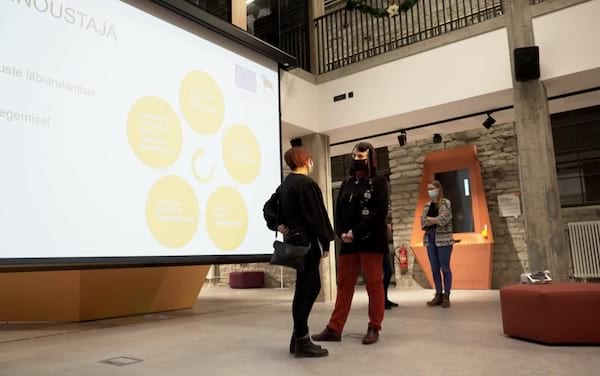 Since October last year, the Integration Foundation has organized meetings supporting the adaptation of returnees to Estonia, where more than 150 returnees and compatriots living in other countries were able to share their experience and practical information in adapting to a new life in Estonia. The meetings for sharing experiences will continue this year as well.
Since October last year, the Integration Foundation has organized meetings supporting the adaptation of returnees to Estonia, where more than 150 returnees and compatriots living in other countries were able to share their experience and practical information in adapting to a new life in Estonia. The meetings for sharing experiences will continue this year as well.
During the meetings, the participants had the opportunity to listen to how other returnees have managed to adapt in Estonia, receive the necessary information and support to better organize their lives, share their experiences, joys and worries, and make new friends.
"Returnees from very different countries participated in the meetings with their very exciting stories. For our part, we partnered with the Estonian Unemployment Insurance Fund's Career Centre - a couple of meetings took place with them, discussing labour market opportunities and career choices," said Kaire Cocker, Head of the Integration Foundation's Compatriots Counselling Service.
"Unfortunately, due to the spread of the coronavirus, many contact meetings were cancelled, but at the same time, it provided an opportunity to hold online meetings and involve people planning to return worldwide from the United States, Canada, the United Kingdom, Denmark, the Netherlands, etc. All of them were interested in Estonian life and wanted to meet other Estonians," Kaire Cocker added.
The next experience sharing meeting of returnees will take place on 21 January in Zoom. Additional information is available on the website of the Integration Foundation. At the meeting, we will share information on administration and state aid regarding returns. Marta Traks, a specialist at the Unemployment Insurance Fund, will give an overview of the labour market situation and benefits.
We will soon inform you about the dates of the next experience sharing meetings via our website.
The Integration Foundation advises people who have an interest and desire to return to Estonia, as well as those who have already started a new life in Estonia. Our counsellors help to plan smoother returns to Estonia. Additional information about counselling is provided HERE.
You can also apply for socio-economic return support from the Integration Foundation to alleviate the costs of your return.
Integration Foundation awarded Volunteer’s Friend Label
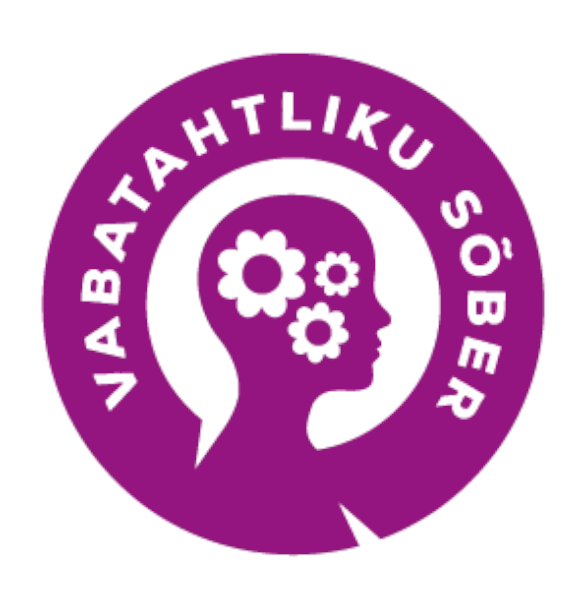 In early January, Minister of Population Affairs Riina Solman presented the Integration Foundation with the prestigious Volunteer’s Friend Label in recognition of its well-planned inclusion of volunteers in line with best practice in voluntary work.
In early January, Minister of Population Affairs Riina Solman presented the Integration Foundation with the prestigious Volunteer’s Friend Label in recognition of its well-planned inclusion of volunteers in line with best practice in voluntary work.
Work with volunteers at the foundation took off when it launched the Language Friends programme. Last spring, it put out a call for mentors to work with Estonian language learners and help them hone their communication skills. More than 400 people volunteered to do so, helping almost 500 learners practise the national language by regularly chatting with them online about a wide range of issues relevant to their lives.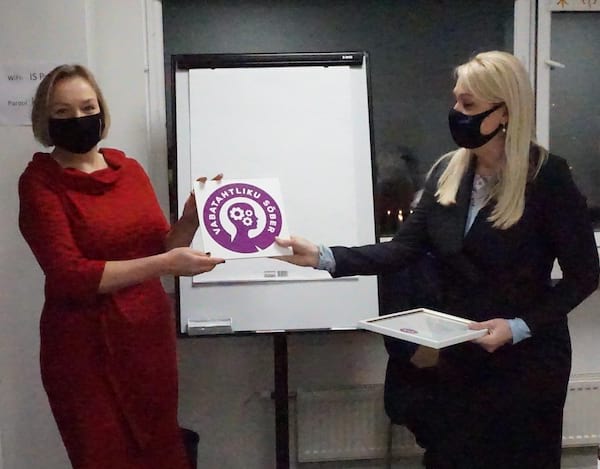
Based on the feedback received from the learners, the mentoring has given them the courage to speak Estonian more often and to continue to study the language. Both they and the mentors remarked that the Language Friends programme brings people from different linguistic backgrounds closer together.
A big thank you to all of our volunteers! The Volunteer’s Friend Label inspires us to keep working with people all over the country to make Estonia a more cohesive place and to get more people speaking its language.
We will be continuing to bring language friends together this year. Find out more about the Language Friends programme HERE.
The Volunteer’s Friend Label is awarded by the ‘Kodukant’ Estonian Village Movement in association with the Ministry of the Interior.
Open calls for tenders and calls for proposals
Information on the announced calls is published on the Integration Foundation's website at integratsioon.ee/konkursid.
Our calendar
Information on events that take place by our organisation, participation or support, can be found in the calendar published on our website.
Our news
You can read the latest announcements of the Integration Foundation in the news section of our website and on the Facebook page of the Integration Foundation or the Estonian Language House.
